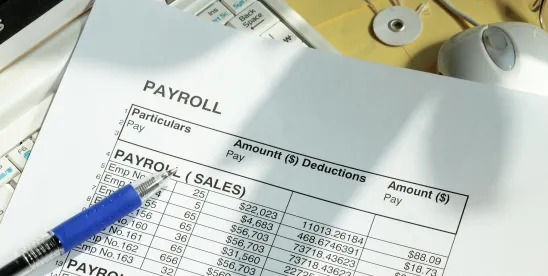In a rare victory for employers, the California Supreme Court unanimously held in Naranjo v. Spectrum Sec. Serv., Inc., S279397 (Decided 6 May 2024) that an employer’s “objectively reasonable, good faith belief” that it has provided employees with compliant wage statements precludes an award of penalties under section 226(e)(1).
GUSTAVO NARANJO V. SPECTRUM SEC. SERV., INC.
Fifteen years have passed since Gustavo Naranjo filed a putative class action against his former employer Spectrum Security Services, alleging meal period violations, seeking meal period premium wages, and seeking derivative claims for waiting time penalties under Labor Code section 203 and wage statement penalties under Labor Code section 226. In 2022, Naranjo asked the court to clarify whether the premium pay for meal and rest breaks constitutes “wages” rather than penalties. (Naranjo v. Spectrum Sec. Serv., Inc. 13 Cal.5th 93 (2022).) The court held that missed-break premium pay is “wages” subject to the timely payment and reporting requirements under the Labor Code and can support both section 203 waiting time penalties and section 226 wage statement penalties. Our full analysis of that decision can be accessed here.
THE LAW
Labor Code section 226(a) requires employers to provide employees with written, accurate itemized wage statement that lists certain enumerated categories related to their pay, including gross wages earned, total hours worked, and deductions, among others. Section 226(e)(1) provides employees who suffer injury because of the employer’s “knowing and intentional” failure to comply with section 226(a) the ability to recover the greater of statutory penalties of US$50-US$100 per violation (up to US$4,000) or actual damages, plus attorney’s fees and costs.
THE CALIFORNIA SUPREME COURT’S DECISION
Following the 2022 Naranjo decision, the case was remanded to determine whether Spectrum was liable for penalties under Labor Code section 226(e)(1) for knowing and intentional failure to comply with the wage statement statute. The trial court answered in the affirmative, and Spectrum appealed. The question before the court this time was whether an employer has knowingly and intentionally failed to comply with section 226’s requirements when the employer had a good faith, yet erroneous, belief that it was in compliance.
The court conducted a careful review of the construction of the penalty provision in section 226. First, the court noted that the “knowing and intentional” language does not appear in the liability provision, but in the penalty provision. This indicates that liability does not require a particular mental state since an employer who issues incomplete wage statements is clearly not complying with the statute. However, penalties under section 226(e)(1) require scienter and “only come into play when the employer knowingly and intentionally fails to comply” with the statute. (Slip op. at 19.) The court declined to deviate from the general rule that courts “refuse to impose civil penalties against those parties who acted in good faith and belief in the legality of their actions.” (Id. at 17.)
Second, the Court considered the relationship between section 226 and the other provisions of the Labor Code, including section 203, which penalizes employers for late wage payments based on a heightened “willful” mental state requirement. An employer’s good faith dispute that any wages are owed will preclude an imposition of waiting time penalties under section 203. (Cal. Code Regs., tit. 8, § 13520.) The court observed that section 203 may trigger penalties for the willful failure to pay, but section 226(e)(1) penalties may be incurred for the knowing and intentional failure to comply with the statute. (Slip Op. at 26.) The wording of section 226’s penalty provision reaffirmed the court’s position that the Labor Code considers an employer’s good faith defense to penalties for nonpayment and nonreporting alike.
The court was not persuaded by Naranjo’s objection that permitting an employer to raise a defense based on good faith belief that it was complying with the statute ran counter to the established legal maxim that “ignorance of the law is no excuse.” The court disagreed with Naranjo, stating that the maxim makes exceptions, including for unwitting violations. (Id. at 29.) The court was also not persuaded by Naranjo’s concerns that excusing employers from section 226 penalties based on a good faith mistake of law would excuse and even incentivize ignorance of the law. On the contrary, the court said that lower courts are already tasked with evaluating an employer’s good faith when determining waiting time penalties under section 203. In those instances, the courts have focused on whether the employer’s basis for disputing the liability was “objectively reasonable.” As such, courts are already equipped to “evaluate an employer’s misunderstanding of legal requirements against a standard of objective reasonableness.” (Id. at 38.)
Finally, the court gave great credence to the fact that section 226’s legal requirements were uncertain and unsettled, evidenced by Naranjo’s 15-year litigation span. Constant throughout Naranjo’s litigation was Spectrum’s reasonable, good faith belief that it was complying with the law, even if it was a mistaken belief. Given the legal uncertainties, the court held that Spectrum’s failure to include the unpaid meal premiums in employees’ wage statements was not “knowing and intentional” within the meaning of section 226(e)(1). The court’s holding strongly implies that the mere knowledge of predicate facts is insufficient to establish “knowing and intentional” violation.
WHAT NARANJO MEANS FOR EMPLOYERS
The Naranjo decision permits employers to raise objectively reasonable, good faith belief defenses to wage statement claims, which, even if unsuccessful, can defeat a claim for section 226 penalties. However, employers should be aware that courts will scrutinize those defenses and reject frivolous defenses.
We remind employers to conduct periodic audits of their wage and hour policies and practices, along with wage statements, to ensure compliance with California’s sometimes technical laws.




 />i
/>i
